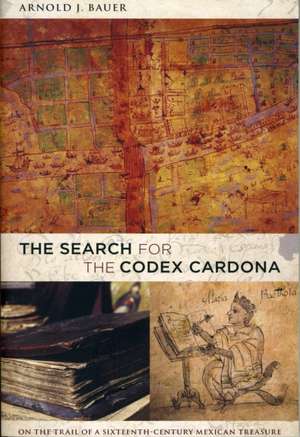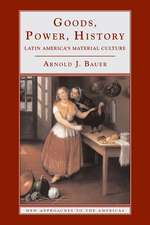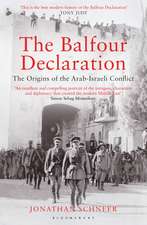The Search for the Codex Cardona
Autor Arnold Baueren Limba Engleză Paperback – 2 dec 2009
Preț: 194.60 lei
Nou
Puncte Express: 292
Preț estimativ în valută:
37.24€ • 38.88$ • 30.82£
37.24€ • 38.88$ • 30.82£
Carte tipărită la comandă
Livrare economică 04-18 aprilie
Preluare comenzi: 021 569.72.76
Specificații
ISBN-13: 9780822346142
ISBN-10: 0822346141
Pagini: 208
Ilustrații: 8 page color insert
Dimensiuni: 157 x 230 x 13 mm
Greutate: 0.3 kg
Editura: MD – Duke University Press
Locul publicării:United States
ISBN-10: 0822346141
Pagini: 208
Ilustrații: 8 page color insert
Dimensiuni: 157 x 230 x 13 mm
Greutate: 0.3 kg
Editura: MD – Duke University Press
Locul publicării:United States
Cuprins
Preface ix
Acknowledgments xi
1. The Crocker Lab 1
2. A World of Painted Books 10
3. Early Doubts 24
4. Sotheby's of London 30
5. The Getty 41
6. Sloan Ranger 52
7. Nights in the Gardens of Coyoacan 63
8. A Mysterious Affidavit 72
9. Seville 78
10. Christie's of New York 88
11. El Palacio del Marqués 97
12. Librería Zócalo 104
13. An Internet Posting 117
14. The Architect's Studio 125
15. Pasaje de las Flores 139
16. The High End 146
17. Ibiza 153
18. A Madrid Anticuario 162
19. Resolution 167
Notes 171
Bibliography 173
Index 177
Acknowledgments xi
1. The Crocker Lab 1
2. A World of Painted Books 10
3. Early Doubts 24
4. Sotheby's of London 30
5. The Getty 41
6. Sloan Ranger 52
7. Nights in the Gardens of Coyoacan 63
8. A Mysterious Affidavit 72
9. Seville 78
10. Christie's of New York 88
11. El Palacio del Marqués 97
12. Librería Zócalo 104
13. An Internet Posting 117
14. The Architect's Studio 125
15. Pasaje de las Flores 139
16. The High End 146
17. Ibiza 153
18. A Madrid Anticuario 162
19. Resolution 167
Notes 171
Bibliography 173
Index 177
Recenzii
The Search for the Codex Cardona is a terrific read. I could hardly put it down. If the Codex is real, and I came to believe that it probably is authentic, then it is the most important document of the early colonial world to have come to light in more than 100 years.Mary Miller, Dean of Yale College and author of The Art of Mesoamerica: From Olmec to Aztec
The Search for the Codex Cardona is, like an Aztec worldview, about a paradox and a pilgrimage through caves, cities, and marketplaces. Is it part of a very energetic hoax or a story representing the tragic losses of the indigenous Mexican world, carried, washed, and burned away in the millennial passions of the Spaniards? The author makes us ask, Could it be that there was once such a book of Mexican wonder and cultural creativity telling of the space and time of the Aztecs and their profound encounter with the strangers from across the sea? A book now dismembered into scattered pieces of stories and images, waiting for a new generation to piece the stories back together? The real value of the book is that it leaves the reader wondering whether it is an example of a deep human drive to play the trickster with us or whether the Codex is just around the corner in a rare books shop or closet. Reader Beware! Reader Alert!Davíd Carrasco, Neil L. Rudenstine Professor of the Study of Latin America, Harvard University
"A chance invitation to view a rare book said to have been produced in early Mexico led Bauer to a quarter-century investigation into the origin and ownership of the Codex Cardona. This ancient book, filled with lavish decorations akin to a Book of Hours and including maps with tax data like the Domesday Book, was written in Mexico around the mid-16th century. As in the best suspense novels, Bauer begins in the middle of the action. Obsessed with tracing the provenance and present location of this historical volume, he follows clues into the murky world of international antiquities dealers and prestigious auction houses. His intriguingly conspiratorial tone enables the reader to be privy to his search for the answers to the scholarly riddles." - Brian RenVall, Mesalands Community Collage, The Library Journal"This is the strangest book that I have ever reviewed. It is part mystery story, part fantasy and part history. The book concerns the sudden and unexpected appearance in 1982 at Sotheby's London of a magnificent manuscript purported to be a 16th-century Aztec painted book called the Codex Cardona. If authentic, it would have been the most extensive codex yet discovered, totalling 427 pages, with more than 300 painted illustrations and two detailed and extraordinary maps. Such a treasure would revolutionise the study of Aztec civilisation and early-period colonial rule in Mexico. The manuscript was supposedly assembled under the direction of one Captain Alonzo Cardona y Villaviciosa between the years 1550 and 1556. And yet there is no record of this captain, and no expert had ever heard of the Codex Cardona. Herein lies the mystery that this book sets out to solve" - Alan R Sandstrom, Times Higher Education
"The Search for the Codex Cardona is a terrific read. I could hardly put it down. If the Codex is real, and I came to believe that it probably is authentic, then it is the most important document of the early colonial world to have come to light in more than 100 years."--Mary Miller, Dean of Yale College and author of The Art of Mesoamerica: From Olmec to Aztec "The Search for the Codex Cardona is, like an Aztec worldview, about a paradox and a pilgrimage through caves, cities, and marketplaces. Is it part of a very energetic 'hoax' or a story representing the tragic losses of the indigenous Mexican world, carried, washed, and burned away in the millennial passions of the Spaniards? The author makes us ask, 'Could it be that there was once such a book of Mexican wonder and cultural creativity telling of the space and time of the Aztecs and their profound encounter with the strangers from across the sea? A book now dismembered into scattered pieces of stories and images, waiting for a new generation to piece the stories back together?' The real value of the book is that it leaves the reader wondering whether it is an example of a deep human drive to play the trickster with us or whether the Codex is just around the corner in a rare books shop or closet. Reader Beware! Reader Alert!"--David Carrasco, Neil L. Rudenstine Professor of the Study of Latin America, Harvard University "A chance invitation to view a rare book said to have been produced in early Mexico led Bauer to a quarter-century investigation into the origin and ownership of the Codex Cardona. This ancient book, filled with lavish decorations akin to a Book of Hours and including maps with tax data like the Domesday Book, was written in Mexico around the mid-16th century. As in the best suspense novels, Bauer begins in the middle of the action. Obsessed with tracing the provenance and present location of this historical volume, he follows clues into the murky world of international antiquities dealers and prestigious auction houses. His intriguingly conspiratorial tone enables the reader to be privy to his search for the answers to the scholarly riddles." - Brian RenVall, Mesalands Community Collage, The Library Journal "This is the strangest book that I have ever reviewed. It is part mystery story, part fantasy and part history. The book concerns the sudden and unexpected appearance in 1982 at Sotheby's London of a magnificent manuscript purported to be a 16th-century Aztec painted book called the Codex Cardona. If authentic, it would have been the most extensive codex yet discovered, totalling 427 pages, with more than 300 painted illustrations and two detailed and extraordinary maps. Such a treasure would revolutionise the study of Aztec civilisation and early-period colonial rule in Mexico. The manuscript was supposedly assembled under the direction of one Captain Alonzo Cardona y Villaviciosa between the years 1550 and 1556. And yet there is no record of this captain, and no expert had ever heard of the Codex Cardona. Herein lies the mystery that this book sets out to solve" - Alan R Sandstrom, Times Higher Education
The Search for the Codex Cardona is, like an Aztec worldview, about a paradox and a pilgrimage through caves, cities, and marketplaces. Is it part of a very energetic hoax or a story representing the tragic losses of the indigenous Mexican world, carried, washed, and burned away in the millennial passions of the Spaniards? The author makes us ask, Could it be that there was once such a book of Mexican wonder and cultural creativity telling of the space and time of the Aztecs and their profound encounter with the strangers from across the sea? A book now dismembered into scattered pieces of stories and images, waiting for a new generation to piece the stories back together? The real value of the book is that it leaves the reader wondering whether it is an example of a deep human drive to play the trickster with us or whether the Codex is just around the corner in a rare books shop or closet. Reader Beware! Reader Alert!Davíd Carrasco, Neil L. Rudenstine Professor of the Study of Latin America, Harvard University
"A chance invitation to view a rare book said to have been produced in early Mexico led Bauer to a quarter-century investigation into the origin and ownership of the Codex Cardona. This ancient book, filled with lavish decorations akin to a Book of Hours and including maps with tax data like the Domesday Book, was written in Mexico around the mid-16th century. As in the best suspense novels, Bauer begins in the middle of the action. Obsessed with tracing the provenance and present location of this historical volume, he follows clues into the murky world of international antiquities dealers and prestigious auction houses. His intriguingly conspiratorial tone enables the reader to be privy to his search for the answers to the scholarly riddles." - Brian RenVall, Mesalands Community Collage, The Library Journal"This is the strangest book that I have ever reviewed. It is part mystery story, part fantasy and part history. The book concerns the sudden and unexpected appearance in 1982 at Sotheby's London of a magnificent manuscript purported to be a 16th-century Aztec painted book called the Codex Cardona. If authentic, it would have been the most extensive codex yet discovered, totalling 427 pages, with more than 300 painted illustrations and two detailed and extraordinary maps. Such a treasure would revolutionise the study of Aztec civilisation and early-period colonial rule in Mexico. The manuscript was supposedly assembled under the direction of one Captain Alonzo Cardona y Villaviciosa between the years 1550 and 1556. And yet there is no record of this captain, and no expert had ever heard of the Codex Cardona. Herein lies the mystery that this book sets out to solve" - Alan R Sandstrom, Times Higher Education
"The Search for the Codex Cardona is a terrific read. I could hardly put it down. If the Codex is real, and I came to believe that it probably is authentic, then it is the most important document of the early colonial world to have come to light in more than 100 years."--Mary Miller, Dean of Yale College and author of The Art of Mesoamerica: From Olmec to Aztec "The Search for the Codex Cardona is, like an Aztec worldview, about a paradox and a pilgrimage through caves, cities, and marketplaces. Is it part of a very energetic 'hoax' or a story representing the tragic losses of the indigenous Mexican world, carried, washed, and burned away in the millennial passions of the Spaniards? The author makes us ask, 'Could it be that there was once such a book of Mexican wonder and cultural creativity telling of the space and time of the Aztecs and their profound encounter with the strangers from across the sea? A book now dismembered into scattered pieces of stories and images, waiting for a new generation to piece the stories back together?' The real value of the book is that it leaves the reader wondering whether it is an example of a deep human drive to play the trickster with us or whether the Codex is just around the corner in a rare books shop or closet. Reader Beware! Reader Alert!"--David Carrasco, Neil L. Rudenstine Professor of the Study of Latin America, Harvard University "A chance invitation to view a rare book said to have been produced in early Mexico led Bauer to a quarter-century investigation into the origin and ownership of the Codex Cardona. This ancient book, filled with lavish decorations akin to a Book of Hours and including maps with tax data like the Domesday Book, was written in Mexico around the mid-16th century. As in the best suspense novels, Bauer begins in the middle of the action. Obsessed with tracing the provenance and present location of this historical volume, he follows clues into the murky world of international antiquities dealers and prestigious auction houses. His intriguingly conspiratorial tone enables the reader to be privy to his search for the answers to the scholarly riddles." - Brian RenVall, Mesalands Community Collage, The Library Journal "This is the strangest book that I have ever reviewed. It is part mystery story, part fantasy and part history. The book concerns the sudden and unexpected appearance in 1982 at Sotheby's London of a magnificent manuscript purported to be a 16th-century Aztec painted book called the Codex Cardona. If authentic, it would have been the most extensive codex yet discovered, totalling 427 pages, with more than 300 painted illustrations and two detailed and extraordinary maps. Such a treasure would revolutionise the study of Aztec civilisation and early-period colonial rule in Mexico. The manuscript was supposedly assembled under the direction of one Captain Alonzo Cardona y Villaviciosa between the years 1550 and 1556. And yet there is no record of this captain, and no expert had ever heard of the Codex Cardona. Herein lies the mystery that this book sets out to solve" - Alan R Sandstrom, Times Higher Education
Notă biografică
Arnold J. Bauer is Professor Emeritus in the Department of History at the University of California, Davis.
Textul de pe ultima copertă
""The Search for the Codex Cardona" is a terrific read. I could hardly put it down. If the Codex is real, and I came to believe that it probably "is" authentic, then it is the most important document of the early colonial world to have come to light since the Florentine Codex surfaced in Italy in the late nineteenth century."--Mary Miller, Dean of Yale College and author of "The Art of Mesoamerica: From Olmec to Aztec"
Descriere
Bauer's quest to track down and authenticate the Codex Cardona, a Mexican "painted book" which may date from the 16th century and has been assessed inconclusively by such places as Sotheby's, the Getty, and Stanford University














